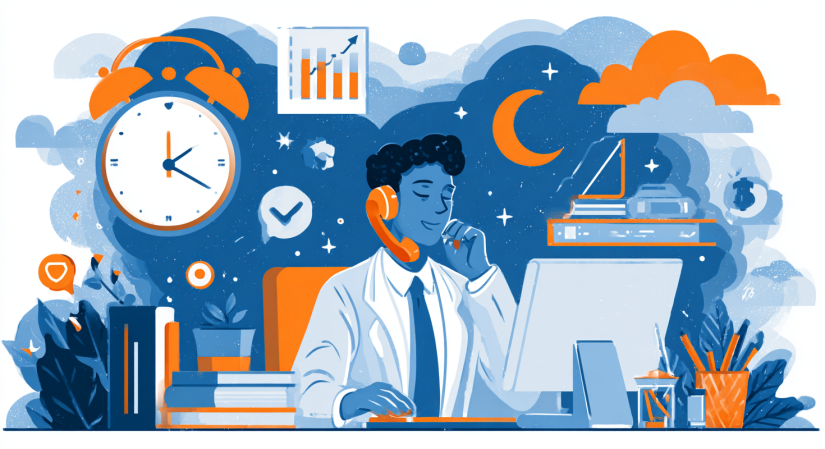Call recording systems have evolved into essential resources for customer service professionals. They offer invaluable insights into customer interactions, aid in quality assurance, and serve as vital training resources. However, navigating the legal landscape of call recording can be complex.
Here, we shed light on the essential aspects of customer service call recording laws, ensuring that your use of recording systems, including audio and voice recording systems, complies with legal standards.
Leverage Convin Recording System and Gain Customer Trust
Understanding Call Recording
Call recording involves using phone call recording systems to capture conversations between customer service representatives and customers. These recordings can be used for various purposes, including improving service quality, resolving disputes, and ensuring compliance.

The Importance of Recording Systems in Customer Service
Recording systems significantly improve customer service quality and efficiency by providing valuable insights, training, quality assurance, and compliance tools.
- Quality Assurance: Recordings help monitor and improve the quality of customer interactions.
- Training and Development: They provide real-life examples for training new agents.
- Dispute Resolution: Recorded calls can serve as evidence in resolving customer disputes.

Legal Considerations in Call Recording
When implementing call recording systems in customer service, it's crucial to understand and adhere to legal requirements, which can vary significantly depending on the region or country.
- Consent and Notification
- One-party Consent: In some jurisdictions, only one party (i.e., the call center) needs to consent to the recording.
- Two-party Consent: Other regions require consent from both parties involved in the call.
- Explicit Notification
- It's often mandatory to inform customers that their call is being recorded. This can be done through automated messages at the beginning of the call or verbally by the agent.

Recognizing Call Recording Laws for Customer Service in The US
Call recording is a crucial tool for improving customer service quality, guaranteeing compliance, and settling disputes. However, navigating the legal landscape surrounding call recording in the United States is crucial to maintaining transparency and adhering to established regulations.
From privacy concerns to specific state laws, understanding the intricacies of call recording is essential for businesses to operate ethically and lawfully.
a. Legal Framework: Ensuring Compliance in Call Recording
Call recording laws in the USA revolve around consent, notification, and privacy protection. The regulations vary significantly between states, categorized as one-party consent or all-party consent states. In one-party consent states, only one individual participating in the call needs to consent to recording, while in all-party consent states, all involved parties must provide consent.
b. Key Considerations and Best Practices for Recording Systems
Implementing reliable recording systems entails adhering to legal requirements, informing callers about recording practices, and handling sensitive information securely. Voice recording systems must comply with federal and state laws, ensure clarity in recorded messages, and allow easy access to recorded calls for necessary purposes while safeguarding privacy.
c. Navigating the Complexity of Call Recording Laws
Navigating the legal complexities of phone call recording systems demands a comprehensive understanding of state laws and federal regulations like the Electronic Communications Privacy Act (ECPA) and the Telephone Consumer Protection Act (TCPA).
Businesses must prioritize compliance, provide clear notifications about call recording, and handle data securely to prevent legal repercussions.
In the United States, customer service call recording laws vary by state, but they generally fall under two categories: one-party consent and two-party (or all-party) consent laws. Here's a brief overview:
Federal Law:
- One-Party Consent: Under federal law, call recording is permitted as long as one party in the conversation consents to the recording. This means that if the person recording the call is a participant in the conversation, their consent alone is sufficient.
State Laws:
- Two-Party Consent: Several states, including California, Florida, Pennsylvania, and Washington, require the consent of all parties involved in the conversation. This means that in these states, everyone participating in the call must be informed of and agree to the recording.
- One-Party Consent States: In other states, the law aligns with the federal standard of one-party consent.
d. Optimal Methods for Adherence:
- Informing Callers: It's a common practice to use automated messages at the beginning of calls to inform customers that the call may be recorded for quality assurance purposes.
- Explicit Consent: In two-party consent states, obtaining explicit consent from the customer before proceeding with the recording is crucial.
- Employee Training: Customer service representatives should be trained on the legal requirements of call recording, especially if they handle calls from states with different consent laws.
e. Value of Adherence
Non-compliance with these laws can lead to legal challenges, including lawsuits and fines. Therefore, businesses must be aware of and adhere to the specific call recording laws of each state where they operate.
While call recording is a valuable tool for businesses in the U.S., navigating the varying state laws and ensuring compliance is essential to avoid legal repercussions.
This blog is just the start.
Unlock the power of Convin’s AI with a live demo.

Best Practices for Compliant Call Recording
Compliant call recording involves obtaining consent, notifying parties, adhering to legal regulations, securely storing recordings, regularly updating policies, maintaining transparency, and having a robust compliance framework.
- Understand Local Laws: Familiarize yourself with the call recording laws specific to the regions where your customers are located.
- Obtain Consent: Ensure that you obtain the necessary consent for recording calls, whether it’s one-party or two-party consent.
- Transparent Notification: Clearly notify customers about the recording, either through pre-recorded messages or directly by the agent.

- Secure Storage: Store call recordings securely to protect customer privacy and comply with data protection laws.
- Access Control: Limit access to call recordings to authorized personnel only.
- Regular Audits: Conduct regular audits of your call recording practices to ensure ongoing compliance.
Explore the best sales call recording option.
Balancing Compliance and Customer Service Excellence
Voice recording systems in customer service can enhance efficiency but require careful legal compliance. Businesses must understand laws, ensure transparent communication, and implement robust security measures.
- Convin offers advanced automated recording systems for customer call recording, enhancing quality assurance, training, and compliance, ensuring comprehensive documentation and accessibility for future reference.
- Convin offers advanced analytics tools for recording conversations, utilizing speech recognition and sentiment analysis to provide valuable insights into customer interactions and enhance service quality and adherence to legal recording requirements.
Schedule a demo to learn more about how AI-powered call recording software can reveal sales insights and increase revenue.
FAQs
1. What are the general rules for call recording?
Call recording laws vary; typically, one-party consent is required, but some regions require all parties to consent. Compliance with privacy and data protection laws is also essential.
2. Can I record a call with customer service?
You can record customer service calls, but you must comply with local laws regarding consent and notification.
3. Do you have to tell a customer the call is being recorded?
In many jurisdictions, especially those requiring two-party consent, you must inform customers that their call is being recorded, often via a pre-recorded message.
4. Why are calls recorded for customer service?
Calls are recorded for quality assurance, training, and regulatory compliance and to provide a record for dispute resolution and customer feedback analysis.


.avif)






.avif)